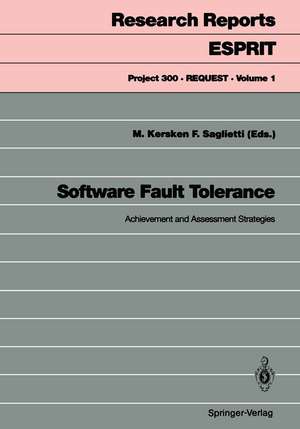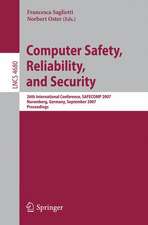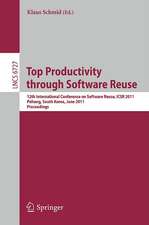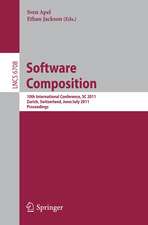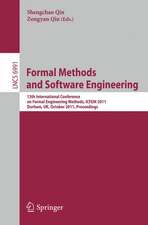Software Fault Tolerance: Achievement and Assessment Strategies: Research Reports Esprit, cartea 1
Editat de Manfred Kersken, Francesca Sagliettien Limba Engleză Paperback – 25 mar 1992
Din seria Research Reports Esprit
- 20%
 Preț: 332.71 lei
Preț: 332.71 lei - 20%
 Preț: 644.81 lei
Preț: 644.81 lei - 20%
 Preț: 334.20 lei
Preț: 334.20 lei -
 Preț: 382.36 lei
Preț: 382.36 lei - 20%
 Preț: 478.74 lei
Preț: 478.74 lei - 20%
 Preț: 647.28 lei
Preț: 647.28 lei - 20%
 Preț: 640.69 lei
Preț: 640.69 lei - 20%
 Preț: 325.63 lei
Preț: 325.63 lei - 20%
 Preț: 324.64 lei
Preț: 324.64 lei - 20%
 Preț: 650.73 lei
Preț: 650.73 lei - 20%
 Preț: 339.80 lei
Preț: 339.80 lei - 20%
 Preț: 641.49 lei
Preț: 641.49 lei -
 Preț: 387.38 lei
Preț: 387.38 lei - 20%
 Preț: 337.52 lei
Preț: 337.52 lei - 20%
 Preț: 328.79 lei
Preț: 328.79 lei - 20%
 Preț: 325.30 lei
Preț: 325.30 lei - 20%
 Preț: 642.19 lei
Preț: 642.19 lei - 20%
 Preț: 640.19 lei
Preț: 640.19 lei - 20%
 Preț: 330.10 lei
Preț: 330.10 lei - 20%
 Preț: 639.52 lei
Preț: 639.52 lei - 20%
 Preț: 329.11 lei
Preț: 329.11 lei - 20%
 Preț: 327.29 lei
Preț: 327.29 lei - 20%
 Preț: 641.87 lei
Preț: 641.87 lei - 20%
 Preț: 335.18 lei
Preț: 335.18 lei - 20%
 Preț: 326.13 lei
Preț: 326.13 lei - 20%
 Preț: 323.34 lei
Preț: 323.34 lei - 20%
 Preț: 331.58 lei
Preț: 331.58 lei - 20%
 Preț: 644.15 lei
Preț: 644.15 lei - 20%
 Preț: 639.85 lei
Preț: 639.85 lei - 20%
 Preț: 322.35 lei
Preț: 322.35 lei - 20%
 Preț: 645.31 lei
Preț: 645.31 lei - 15%
 Preț: 644.49 lei
Preț: 644.49 lei - 20%
 Preț: 327.44 lei
Preț: 327.44 lei - 20%
 Preț: 645.47 lei
Preț: 645.47 lei - 20%
 Preț: 640.19 lei
Preț: 640.19 lei - 20%
 Preț: 345.59 lei
Preț: 345.59 lei - 20%
 Preț: 331.58 lei
Preț: 331.58 lei - 20%
 Preț: 328.60 lei
Preț: 328.60 lei - 20%
 Preț: 334.38 lei
Preț: 334.38 lei - 20%
 Preț: 334.38 lei
Preț: 334.38 lei - 20%
 Preț: 650.27 lei
Preț: 650.27 lei - 15%
 Preț: 657.90 lei
Preț: 657.90 lei - 20%
 Preț: 326.78 lei
Preț: 326.78 lei - 20%
 Preț: 656.84 lei
Preț: 656.84 lei - 20%
 Preț: 647.79 lei
Preț: 647.79 lei - 20%
 Preț: 333.04 lei
Preț: 333.04 lei - 20%
 Preț: 335.18 lei
Preț: 335.18 lei - 20%
 Preț: 325.48 lei
Preț: 325.48 lei - 20%
 Preț: 658.98 lei
Preț: 658.98 lei
Preț: 645.47 lei
Preț vechi: 806.83 lei
-20% Nou
Puncte Express: 968
Preț estimativ în valută:
123.55€ • 134.25$ • 103.85£
123.55€ • 134.25$ • 103.85£
Carte tipărită la comandă
Livrare economică 21 aprilie-05 mai
Preluare comenzi: 021 569.72.76
Specificații
ISBN-13: 9783540552123
ISBN-10: 354055212X
Pagini: 260
Ilustrații: XV, 243 p.
Dimensiuni: 170 x 242 x 14 mm
Greutate: 0.42 kg
Ediția:1992
Editura: Springer Berlin, Heidelberg
Colecția Springer
Seriile Research Reports Esprit, Project 300. REQUEST
Locul publicării:Berlin, Heidelberg, Germany
ISBN-10: 354055212X
Pagini: 260
Ilustrații: XV, 243 p.
Dimensiuni: 170 x 242 x 14 mm
Greutate: 0.42 kg
Ediția:1992
Editura: Springer Berlin, Heidelberg
Colecția Springer
Seriile Research Reports Esprit, Project 300. REQUEST
Locul publicării:Berlin, Heidelberg, Germany
Public țintă
ResearchCuprins
1 Introduction.- 2 Overview.- 2.1 The Concept of Software Fault-tolerance.- 2.2 Failure Dependence.- 2.3 Evaluation of Reliability of Fault Tolerant Software.- 2.4 Adjudication Mechanisms.- 2.5 Conclusion.- References.- 3 Considerations on Software Diversity on the Basis of Experimental and Theoretical Work.- 3.1 The Different Failure Sets of a Two-fold Diverse System.- 3.2 Experimental Approach.- 3.3 Theoretical Approach.- 3.4 Additional Requirements.- 3.5 Comparison Between Single and Diverse Use of Programs.- 3.6 Conclusion.- References.- 4 The Impact of Forced Diversity on the Failure Behaviour of Multiversion Software.- 4.1 Introduction.- 4.2 Common Failure Behaviour of Forced and Unforced Diverse Systems w. r. t. the Voter Majority.- 4.3 Common Failure Behaviour of Forced and Unforced Diverse Systems w. r. t. the Voter Granularity.- 4.4 Conclusion.- References.- 5 Functional Diversity.- 5.1 Introduction.- 5.2 Limitations of Normal Diversity.- 5.3 Description of Functional Diversity Methodology.- 5.4 Advantages of Functional with respect to Normal Diversity.- 5.5 Disadvantages of Functional Diversity.- 5.6 Application Fields.- 5.7 Choice of the Modelling Approach for Functional Diversity.- 5.8 Classical Semantic Approach.- 5.9 Functional Semantics.- 5.10 Semantic Modelling of Functional Diversity.- 5.11 Functional Diversity Metrication.- 5.12 Definition of Functional Diversity Metrics.- 5.13 Classification of the Metrics.- 5.14 Reliability Analysis for Functionally Diverse Systems.- 5.15 Static Specification Analysis.- 5.16 Reliability Evaluation.- 5.17 Semantic Specification Language.- 5.18 Semantic Specification Analysis Methodology.- References.- 6 Estimation of Failure Correlation in Diverse Software Systems with Dependent Components.- 6.1 Introduction.- 6.2 Evaluation of the Inaccuracy Resulting from the Independence Assumption.- 6.3 The Case of Available Failure Observations.- 6.4 The Case of No Available Failure Observations.- 6.5 Conclusion.- References.- 7 Measurement of Diversity Degree by Quantification of Dissimilarity in the Input Partition.- 7.1 Input Partition and Coverage Diversity.- 7.2 Partition Diversity during the Testing Phase.- 7.3 Conclusion.- References.- 8 Comparison of Mnemonics for Software Diversity Assessment.- 8.1 The Initial Prototype Investigation.- 8.2 Enhancement of the Prototype.- 8.3 Further Improvements to Technique.- 8.4 Conclusions.- References.- 9 The FRIL Model Approach for Software Diversity Assessment.- 9.1 Software Attributes Affecting Diversity.- 9.2 Measuring Diversity.- 9.3 The FRIL Model for Software Diversity Assessment.- 9.4 Extension of the Work.- References.- 10 Reliability Evaluation.- 10.1 Introduction.- 10.2 State of The Art of Reliability Models for Fault Tolerant Software.- 10.3 System States of Fault Tolerant Architectures.- 10.4 Analysis of System Sub-states.- 10.5 Modelling Approach.- 10.6 Modelling Methods.- 10.7 Evaluation of the Equations.- References.- 11 The Impact of Voter Granularity in Fault-Tolerant Software on System Reliability and Availability.- 11.1 Definition of System States.- 11.2 Effect of Voter Granularity on System States.- 11.3 Examples.- 11.4 Strategic Choice of Optimal Granularity.- 11.5 Mixed Solutions.- 11.6 Conclusion.- References.- 12 A Theoretical Evaluation of the Acceptance Test in Recovery Block Programming.- 12.1 Introduction.- 12.2 General Features and Examples of Acceptance Tests.- 12.3 Formal Definition of Acceptance Test Characteristics.- 12.4 An Error Model for the Acceptance Test Behaviour.- 12.5 Conclusion.- References.- 13 Locationof Checkpoints by Considering Information Reduction.- 13.1 Introduction.- 13.2 Failure Masking.- 13.3 Function Classes Reducing Information.- 13.4 Impact of Information Reduction on Failure Dependence.- 13.5 Information Reduction for Binary Values.- 13.6 Location of Checkpoints.- 13.7 Example.- 13.8 Conclusion.- References.- 14 Conclusions.- 14.1 Hardware Failure vs. Software Failure.- 14.2 Diversity and the Design of Fault-tolerant Software Systems.- 14.3 Assessment of Software Fault-tolerance.- 14.4 Prospect.
